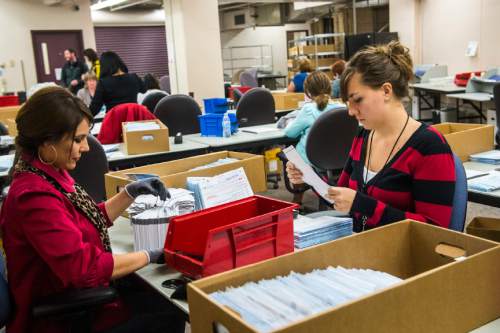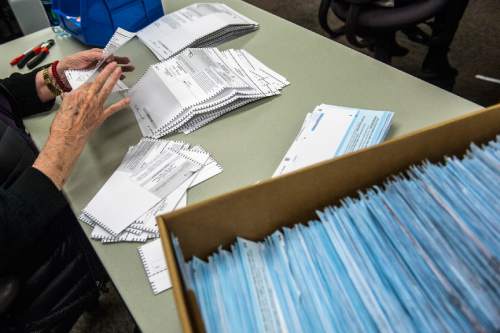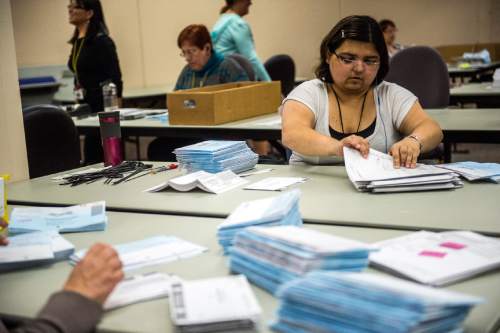This is an archived article that was published on sltrib.com in 2015, and information in the article may be outdated. It is provided only for personal research purposes and may not be reprinted.
The recent two-week wait to learn the winners in close elections like the Salt Lake City mayor's race and Prop 1 may be the last one anxious candidates and voters have to endure.
The Legislature's Government Operations Interim Committee unanimously endorsed a bill Wednesday that would require county clerks to provide daily updates on any votes they count between election night and the official canvass, a week to two weeks later.
That comes, of course, after the outcome was in doubt for two weeks for close contests in the Nov. 3 election. Citing state law prohibiting public disclosure of updated tallies of late-arriving by-mail ballots, clerks went into a two-week silent period beginning Nov. 4.
"This bill would take the handcuffs off them," said Rep. Steve Eliason, R-Sandy, sponsor of the bill.
He likened the current situation to having a contested call on a deciding last-play touchdown in a football game, only to have the referees announce that they will not reveal who won for two weeks. Fans "would probably storm the field."
Eliason said county clerks would not be required to count votes daily — they might be busy with ballot verification or other activities — but they would need to publicly report any votes that are counted. County clerks said they would support the bill as long as they're given flexibility on the timing of vote counts.
Making winners apparent through frequent updates is important not just because of public interest, but because it allows winners to start transitioning into office and hiring staff — and workers for losing candidates to seek new jobs.
The bill will now go to the full Legislature for consideration when it convenes in January.
—
Other action • The committee also considered several other tweaks to election law Wednesday.
It voted down one proposal that would have partially lifted a ban on lawmakers accepting donations while the Legislature is in session. Rep. Dan McCay, R-Riverton, proposed a narrow exception for people who provide "in-kind" donations by gathering signatures to help lawmakers qualify to appear on the ballot.
Rep. Patrice Arent, D-Millcreek, objected, saying it would mean that lobbyists dealing with legislators during the session could also be leading signature gathering for them at the same time. She successfully amended that provision out of McCay's bill.
The committee did endorse other parts of McCay's election-amendments bill, including removing the ability of a political party to replace a candidate who is disqualified for failing to file a campaign financial disclosure report, and also setting filing deadlines in local school board elections.
Members also supported two bills to make it a bit easier for people to try to rescind state and local legislation they dislike via ballot referendum.
One bill by Rep. Brian Greene, R-Pleasant Grove, would expand the power to challenge legislation beyond the Legislature, counties and cities to include actions by school boards, water districts and other local governments.
Another bill by Rep. Fred Cox, R-West Valley City, would give residents more time to decide whether to challenge laws passed by the Legislature.
Under current law, Utahns have to file notice that they will gather petitions within five days after the Legislature adjourns. The change would allow them to wait until five days after the governor signs a bill, or allows it to become law without his signature.







